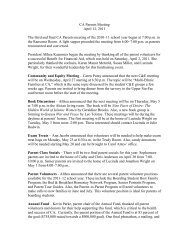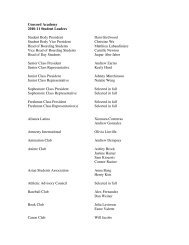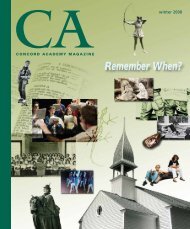CAMPUS
Meet Rick Hardy - Concord Academy
Meet Rick Hardy - Concord Academy
You also want an ePaper? Increase the reach of your titles
YUMPU automatically turns print PDFs into web optimized ePapers that Google loves.
listen carefully, police our own, and (most importantly)to rely on each other. It was very physicallydemanding, but a lot more mentallystraining.really, umm, no, I don’t think I am. I have confidencein the training I’ve been given and don’thave any doubt that the rest of my squad and Iwill come back safely, as long as we do our job.Jon CrispinC O N C O R D A C A D E M Y M A G A Z I N E F A L L 2 0 0 9Overall, how are the troops treated?The Marines I have come to live with are treateddifferently by different ranks. Senior Marinescontinue to educate and discipline those belowthem, as the junior guys are less experienced. Ifyou act like a man, you will be treated like a man.What’s the best and worst part about it?The best part about it is definitely the relationshipsyou make with your fellow Marines.The guys you see on a daily basis are the onesyou have to rely on; without them all this s—-would be impossible. The worst part about theMarines is the tedious things: uniform inspections,room inspections, mass punishment,things like that. But I guess that’s what makesit the Marines, right?How do you feel about the war in Iraq assomeone who is going to fight it?The war in Iraq has become much more personalthan political for me. I knew very well cominginto the military with an infantry MOS (MilitaryOccupational Specialty) that I would be deploying.My main concern is to bring the mento the left and right of me home. It’s funny howlittle you think about your own life when youthink about your best buddies getting shot orblown up.How does your family feel about your joiningthe military?My family, much to my surprise, has been verysupportive. They understood that I didn’t justjump into this decision. They care about me andwant me to come back safe.Are you scared?Ha-ha. I’m not allowed to be scared. No, butCliff Farrar’s battalion in Iraq28Are you given any training on what life inIraq is like for Iraqis? Do they teach you anyArabic?You hear from guys that have been over therewhat things are like on a day-to-day basis, as faras what is done and how it’s done. We aretaught very little Arabic though. Every squad hasa terp (interpreter).What do you think about the people who areagainst the war?People who are against the war are entitled totheir own opinions. It’s the ones that call meand my fellow Marines “baby killers” and“mindless tools” that I’d really like to get alonein an alleyway.Have you asked or has anyone told?No and no. As long as the man next to mewatches my a — and doesn’t get himself killed,it’s of no concern to me what he does in hispersonal life.Anything else you want to say or talk about?Yes, actually. First, Marines aren’t just stupidapes that wander around killing whatever theysee. It’s the 0.01 percent that murder theirgirlfriends and throw puppies off cliffs that giveus a bad name. True, our job requires a certainamount of training in environments of acceleratedviolence, but every action performedhas been reinforced by many hours of trainingand over 230 years’ worth of experience. TheMarine Corps was founded on November 10,1775. We’re older than the Army; we knowwhat we’re doing.Second, a soldier is in the Army. A Marine isin the Marines. Stop confusing the two. Marineshave a lot of pride in their history and leadership.The Army, well, let’s just say they could learn athing or two from the Marine Corps. Chuh.Reading over the interview, I’m left feelingunfulfilled. I would not say it seems like Cliffhas changed much. The responses still made melaugh. I could picture Cliff saying those wordsin his half-angry, half-joking manner. At thesame time, I was struck by the clear homogenizingeffect that the training had had on him. Iwas always impressed by Cliff’s sense of duty,but I realized I would be unable to survive inhis situation.I see what Cliff is doing, and I feel ashamedThe future Marine as a varsity soccer player at CAof myself. I realize I would be too scared to join,even if I didn’t oppose the war. As hard as I try, Ican’t think of anything that would motivate meto get over my fears. For some, poverty and lackof opportunity are motivations enough, as I discoveredwhen I attended the Campus AntiwarNetwork’s talk with Iraq Veterans Against theWar. When asked if the lack of an antiwar movementwas a direct result of the lack of a draft,one person responded, “There is a draft, only it’seconomical. For most, enlisting is the only wayto get ahead—that’s why I joined.” While this isnot Cliff’s situation, Cliff will be surroundedby men for whom this is a reality. This adds tomy shame. I escaped their fate through birth.My parents could afford private school; they canafford Cornell. Have my parents essentiallybought my way out of the draft? Were it not formoney, would I be in Iraq?In many ways, Cliff’s presence in the warmakes it almost banal for me. Cliff should be aMarine, so he became one. He did not join asPat Tillman did, as part of a political statement inthe wake of 9/11. He did not join because hebelieves in the war. Cliff joined out of a sense ofduty and the hope that the Marines will providehim with a new direction.. . . It seems more pressing than ever toremember that wars are fought by people. I knowone of those people. I am proud of Cliff fordoing what I could not do. I am left puzzled byhis willingness to join, to fight this war with noend and no purpose. But this was not my choice,it was his. As Cliff goes off to a land of sand andblood, I stay here in the shadow of the tower . . .humbled.











